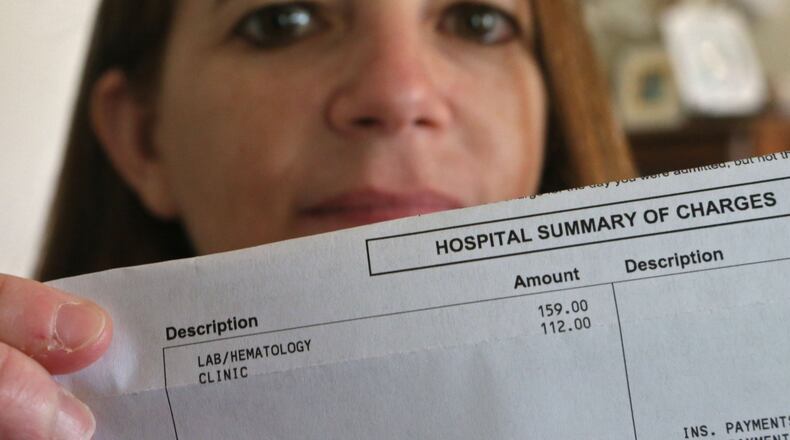A patient scheduled for surgery makes sure that both the hospital and surgeon are in the health plan’s network prior to the operation. But after the surgery, a surprise bill arrives for hundreds of dollars.
It turns out the anesthesiologist used in the procedure was not in the patient’s insurance network, and the patient had no idea. Such “balance billing’’ situations often confound and upset consumers receiving medical care and can lead to tough collections practices.
A state legislative panel hearing Thursday discussed surprise billing for medical care. The subcommittee was chaired by state Sen. Renee Unterman (R-Buford), who said she has heard from many constituents complaining about medical debt, bankruptcies due to medical bills, and credit rating downgrades.
“It’s so hard on the consumer,’’ said Unterman, chair of the Senate Health and Human Services Committee.
Physicians and members of the hospital and insurance industries testified on surprise medical bills, pointing to varying reasons for their use. They agreed, though, that it’s something that can hit consumers hard.
Balance billing occurs when a hospital, physician or other health care provider sends a bill to a managed care patient after the patient’s health insurer has paid its share. The patient owes the balance. Large bills can occur when an out-of-network provider charges a patient an out-of-network rate, usually higher than the rate that in-network providers charge.
Donna Hatcher of the Georgia Hospital Association told Unterman's subcommittee that medical providers often "have no choice but to bill the patient for the balance."
“No hospital wants a patient to be financially disadvantaged,’’ she added.
‘Narrow networks’ to blame?
Hospitals generally don’t know what health plans physicians belong to, Hatcher said. Nor do hospitals have any control over the rates paid to doctors who are not employed by the hospital, she added.
The recent trend toward more limited insurance networks has created more opportunity for surprise billing, Hatcher said.
Dr. Todd Williamson, a Gwinnett County neurologist, said that with more limited choice of medical providers, patients often have ‘’little to no access to doctors they need.”
“Insurance companies have posted record profits’’ in recent years, Williamson said. Meanwhile, he said, “insurance companies have ratcheted (down) payments (to medical providers) to ridiculously low levels.”
He added that doctors write off large amounts of unpaid debt.
Out-of-network specialists
Dr. John Rogers, an emergency medicine physician in Macon, said that insurers have shifted more of the cost of medical care to the patient through higher deductibles and co-pays. An ER balance bill is typically just $100 or less, Rogers added.
Marcus Downs, who represents the Medical Association of Georgia, said his organization calls the practice "fair market billing." The practice often occurs with emergency room care and physicians who are out of network, Downs said.
“It may be a surprise to the patient,’’ he said. “It’s unfortunate. The physician works there — they always had the intention of getting paid.”
But Leanne Gasaway of America’s Health Insurance Plans (AHIP), an industry trade group, said surprise bills are not caused by “inadequate networks.” They’re often triggered when an anesthesiologist, pathologist or another specialist is brought in to assist in a patient’s care, and that physician is not in that patient’s network, she said.
‘Completely unregulated’ in Georgia
“The problem is getting worse,’’ Gasaway said. That’s why “we believe this is a consumer protection issue.” AHIP says out-of-network providers can charge a consumer whatever rates they choose.
Gasaway cited as possible solutions a system that would pay fair and reasonable amounts to non-network providers, and creating a dispute resolution process.
More than a dozen states have passed laws aiming to protect managed care patients from exorbitant balance billing, the Kaiser Family Foundation has reported.
“This is completely unregulated’’ in Georgia, Gasaway said. She called for a solution among all entities involved. “We will all have to change. We believe it’s a shared responsibility to protect patients.”
‘Consumers are left holding the bag’
Barbara Barrett, assistant vice president of human resources for Langdale Industries, based in Valdosta, told the panel that “the consumer doesn’t have any idea what they’re going to be charged.”
Then, after a medical procedure, Barrett said, “there are some very aggressive (tactics) to collect debt.’’
Unterman said after the hearing that she was not sure what approach Georgia should take on these billing practices.
Beth Stephens of Georgia Watch, a consumer advocacy group, said after the hearing that “the consumer in a surprise billing scenario is often the least informed and least able to discover when they might be subject to a surprise bill. And of providers and insurers, they have the least capacity to effectively resolve issues related to balance billing.
“Without protections, consumers are left holding the bag and may have to pay huge medical bills,’’ Stephens said. “We want to see the consumer held harmless in situations where they unknowingly encounter providers outside of their network, particularly in an emergency room setting.”
About the Author
Keep Reading
The Latest
Featured




